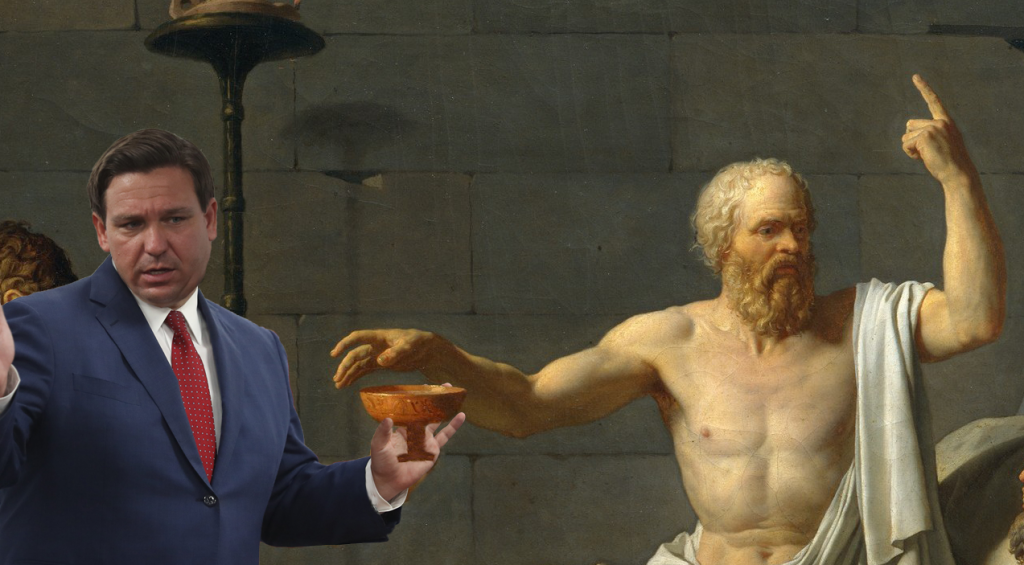Florida Philosophical Association Calls for University Leaders to Stand Up to “Government Overreach into the Academy”
In the face of legislation proposed by Florida governor Ron DeSantis that would violate academic freedom, erode tenure protections, and diminish faculty governance at the state’s universities and colleges (see a summaries here and here) the Florida Philosophical Association (FPA) has issued a letter to the leaders of those schools calling for them to “uphold and publicly defend academic freedom, tenure, and shared faculty governance in the educational institutions for which you are responsible.”
Objecting to DeSantis’ plans to prohibit the teaching of certain topics, they write:
The professoriate stands accused, by politicians, of “indoctrinating” students. Like Socrates (famously, and falsely, accused of “corrupting the youth” and “impiety”), we teach our students to think critically about common wisdom, to question authority, and to welcome fresh perspectives and ideas—even when doing so results in discomfort. We urge you to reject political edicts that prohibit the teaching of ideas on which we might disagree, that replace critical academic inquiry with pre-packaged state-approved lessons, and that demand fearful obedience rather than the courage to have difficult conversations about truth and justice.

Here’s the complete text of the letter (dated February 25th, 2023):
Dear Academic Leaders at Florida State Colleges and Universities,
As members of the Florida Philosophical Association (FPA)—faculty and students across Florida’s many colleges and universities—we write to university and college boards of trustees, presidents, provosts and other academic leaders regarding our professional commitment to uncensored inquiry and our responsibility to provide our students with knowledge and critical thinking skills spanning many areas and styles of philosophical inquiry.
Founded in 1955, the FPA is one of the largest and most active regional philosophy organizations in the United States, whose mission it is to facilitate the exchange of ideas among all those engaged in this field of inquiry, regardless of rank, age, status, gender, race, ability, or other differentiating characteristic. Our members include those who study classical Western philosophy and those who study non-Western, feminist, decolonial, environmental, and other philosophical traditions raising sometimes difficult and uncomfortable questions.
We write with a sense of urgency to implore you to uphold and publicly defend academic freedom, tenure, and shared faculty governance in the educational institutions for which you are responsible. We are alarmed by recent government overreach into the academy, including but not limited to the following: attempts to legislate what and how classroom instructors may teach material within their professional areas of expertise, attempts to eliminate faculty governance over the curricula, attempts to abolish or otherwise compromise tenure, attempts to eliminate faculty involvement in hiring their colleagues and leaders, and attempts to discredit processes of external accreditation by professional peers.
As philosophers, we have a special interest—and considerable training—in the analysis of concepts such as “objectivity,” “impartiality,” “freedom,” “responsibility,” and “fairness,” among other norms that the governor and legislature claim to uphold. Indeed, such concepts are at the core of philosophical work. They are also core to our understanding of the value of a healthy democracy. As anyone in our field—and, indeed, anyone with a doctorate of philosophy (Ph.D.) in any other field—knows, such concepts are complex, difficult, and frequently contested. As those historically entrusted with care for such concepts, we object to the ways in which they are being weaponized for political gain while demonizing those who have devoted their lives to careful study of them. This attack is not only on philosophers, but on the very idea of academic expertise and scholarship in all disciplines. And it compromises not only what faculty may do, but what students may learn.
The professoriate stands accused, by politicians, of “indoctrinating” students. Like Socrates (famously, and falsely, accused of “corrupting the youth” and “impiety”), we teach our students to think critically about common wisdom, to question authority, and to welcome fresh perspectives and ideas—even when doing so results in discomfort. We urge you to reject political edicts that prohibit the teaching of ideas on which we might disagree, that replace critical academic inquiry with pre-packaged state-approved lessons, and that demand fearful obedience rather than the courage to have difficult conversations about truth and justice.
Academic integrity and scholarly rigor depend on inquiry and debate guided by the norms of our professions, rather than political parties. Responsible teaching depends on pedagogical expertise and a willingness to experiment with new ways of reaching students with diverse experiences, aspirations, needs, and abilities. The Florida Philosophical Association joins the American Philosophical Association (APA), the American Association of University Professors (AAUP), and the American Council of Learned Societies (ACLS) in affirming the importance of shared governance in higher education, free from partisan political intrusion.
We urge you, as our academic leaders in the state of Florida, to uphold academic freedom and the ability of all instructors to teach and research responsibly and without fear of state censorship. We urge you to resist political intrusion into higher education.
Sincerely, The Florida Philosophical Association
There is also a copy of the letter at the FPA site, here.
(via Brook Sadler)
Related: “APA Issues Statement on Academic Freedom in Florida”



Channeling the spirit of DR. MLKJR: A threat to philosophy anywhere is a threat to philosophy everywhere.